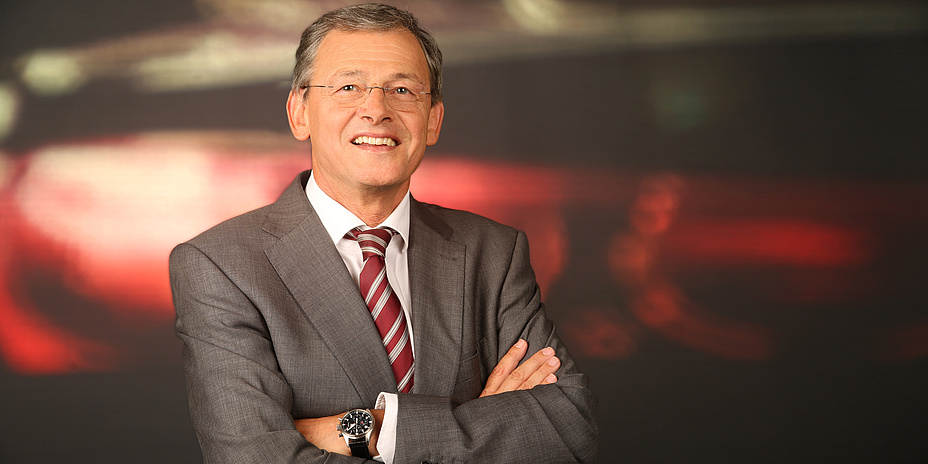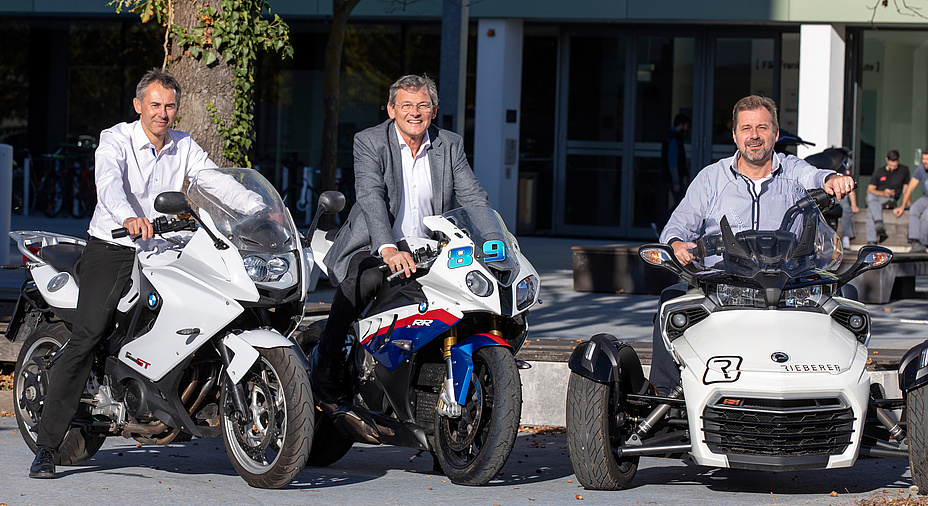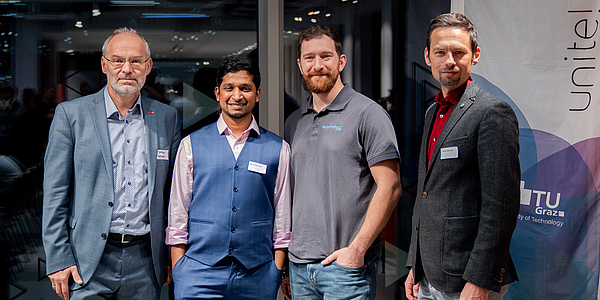The whole spectrum: types of propulsion, motivation and people

Helmut Eichlseder has led the Institute of Internal Combustion Engines and Thermodynamics (IVT) at TU Graz for more than 16 years. The much sought-after expert in propulsion or drive systems in conversation with the News+Stories editorial team speaks about rival technologies, the indispensability of hardware and his love of wheels and people.
News+Stories: Developers of propulsion technologies are living in extremely exciting times. What are the main challenges?
Helmut Eichlseder: The main one is definitely environmental friendliness – a topic which includes both emissions of pollutants as well as greenhouse gas emissions. Three technological approaches are rivalling each other, and each one has its own scope. On the one hand, there is pure battery-electric electric mobility, on the other hand there is the fuel cell as an interesting alternative, and the third approach is the combustion engine. But none of them can provide the single solution requirement alone. This makes the matter very challenging, and also fascinating. The field is completely open.
Do you conduct research into all these technologies at the Institute of Internal Combustion Engines and Thermodynamics?
Helmut Eichlseder: The focus is on combustion engines, to an increasing degree on electrification of drives, but we also cover research into fuel cells. What we don’t do research on is pure battery-electric drive in terms of battery and cell research – that’s reserved for others. For combustion engines there are several paths to the minimisation of pollutants, which are very promising. But fuels play a key role because the really big and globally relevant task is to move away from fossil fuels – I call this defossilisation. This is a difficult – and for an engineer – a fascinating task. Because in many fields of personal and goods transport, the combustion engine won’t be replaced for a long time, not to mention large-scale engines, which for instance power ships. But with respect to pollutant emissions, there is still a lot to be done technologically with these engines. The Large Engines Competence Center near the IVT carries out research in this very exciting field.
The really big and globally relevant task is to move away from fossil fuels – I call this defossilisation.
What type of propulsion will the vehicle you use to drive to a business meeting in Vienna in 15 years time have?
Helmut Eichlseder: If I’m still driving to business meetings in 15 years (laughs), then it will be by means of a combustion engine as now but with a high degree of electrification, in other words electrical components. Hopefully it will be driven by synthetic fuels, in other words artificially produced fuels, so-called e-fuels. These fuels can be renewably produced and offer – just like hydrogen – the possibility of storing renewable energy, which accumulates unevenly. I think e-fuels and hydrogen are possible solutions in long-distance traffic – although in the case of hydrogen the challenge is to roll out the infrastructure. The strengths of battery-electric drives are played off in the inner city. These drives have lower ranges, but are locally free of emissions. If you look at the whole system, currently there is no single winner. The optimum drive depends very much on its application and on the local circumstances.
As a mechanical engineer and thermodynamics expert, you also have to grapple with the interaction between traffic and environment?
Helmut Eichlseder: Thermodynamics taught me to look at the overall system and not just at part of the system. The key phrase here is ‘from the cradle to the grave.’ Today’s legislation only assesses that part of the energy chain from the tank to the wheel in the form of carbon dioxide (CO2) emissions. The energy needed to produce fuel, the drive system itself and batteries are currently not taken into account. And battery production, in particular, is extremely energy intensive. In the political discussion, a lot of content is missed out. And for this reason it is very important for me to contribute to an objective discussion on mobility. For this reason, we at the Institute regularly and deliberately go public with information and events.
Today’s legislation only assesses that part of the energy chain from the tank to the wheel in the form of carbon dioxide (CO2) emissions. The energy needed to produce fuel, the drive system itself and batteries are currently not taken into account.
In addition to your Institute, you also head the Field of Expertise (FoE) Mobility and Production. How much added value does this TU Graz-wide combination of expertise have on vehicle technologies, propulsion systems and product manufacturing methods?
Helmut Eichlseder: The regular meetings and FoE days in which the individual fields of expertise present research areas also promote a lot of internal networking. The main added value comes from the projects which result from this. The fields of Mobility and Production are highly intermeshed, something which is well illustrated in Graz with its industrial environment. On the one hand, there’s AVL, which is a world leader in engine development, and on the other hand, Magna, whose biggest vehicles manufacturing plant is in Graz. And then also in the FoE, we have a start-up funding instrument, which is very important. This means topics in the FoE can be identified which then receive seed funding from TU Graz for applications in competitive funding programmes.
With your different leadership positions, research and teaching – you must have a demanding everyday professional life. What motivates you when you go to work in the morning?
Helmut Eichlseder: Basically it’s the human component. I like working with people very much. It’s fun working with motivated staff to bring about technical progress at the Institute. And among the students, we’ve got very many who are extremely interested and dedicated. What originally interested me, when I left BMW for TU Graz, was technical research in its entire range. With such well equipped infrastructure, such as here at the Institute, this was even more tempting. Experimental facilities like we have here are not the norm, but rather the exception.
Experimental facilities like we have here are not the norm, but rather the exception.

Helmut Eichlseder (centre) with colleagues Stephan Schmidt and Roland Kirchberger in his natural element in front of the Institute of Internal Combustion Engines and Thermodynamics.
How did you get involved in engine research?
Helmut Eichlseder: In the beginning was bicycling and motor sport. What I liked about bicycles was the sport aspect. Only with the motorbike did I develop a love of technology. In my time at higher technical college, I was travelling around Austria as a mechanic with a racing driver. Maybe I have an inherited predisposition (grins). For generations my family was a family of smiths and coach builders in Innviertel (stands up and shows a photo of a farrier and smith, Georg Eichlseder, in front of his workshop).
When was the last time you got your hands dirty on a motor?
Helmut Eichlseder: One month ago at home when I made a vintage car ready for winter. A really old vehicle from 1929, which really does need a bit of care. I don’t get my fingers dirty on the test rigs at the IVT. There are plenty of more skilled and better-trained personnel than me.
It doesn’t matter how much new electronics comes along, there will always be hardware – and I don’t just mean computing hardware...
So, you’re a mechanical engineer by tradition and also by conviction. If you had to choose your study programme again today, would you choose mechanical engineering again?
Helmut Eichlseder: Yes, definitely. I’d look at more electrical and electronics aspects in the study programme, but mechanical engineering with elements of control technology, basic thermodynamics and mechanics including fluid mechanics always makes a good basis. Because it doesn’t matter how much new electronics comes along, there will always be hardware – and I don’t just mean computing hardware – but rather hardware that we can build on or sit on – like a chassis in vehicle construction, a drive system or some kind of structure.
You can find more interviews with people who make TU Graz what it is today on the Face to face website.
Kontakt
Helmut EICHLSEDER
Univ.-Prof. Dipl.-Ing. Dr.techn.
Head of Institute
Institute of Internal Combustion Engines and Thermodynamics
Inffeldgasse 19/III
8010 Graz, Austria
Tel.: +43 316 873 30000
eichlseder@ivt.tugraz.at




